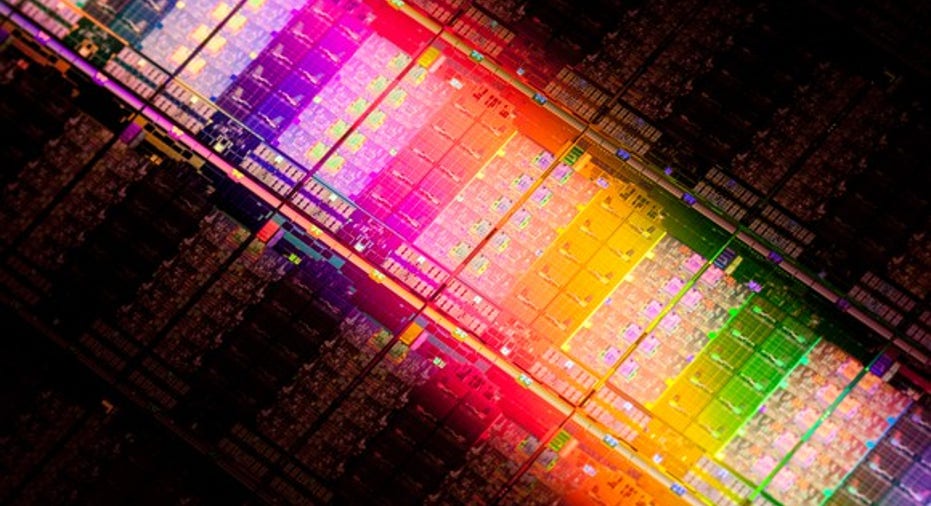How This Apple Inc. Supplier Created Hundreds of Thousands of Jobs in the United States

One of Apple's (NASDAQ: AAPL) most important component suppliers is Taiwan Semiconductor Manufacturing Company (NYSE: TSM), or TSMC for short. TSMC is believed to be the sole manufacturer of the Apple-designed A10 applications processor that powers the iPhone 7 and iPhone 7 Plus, and it also builds chips for many chips that Apple procured from third-party suppliers, to boot.
Image source: Intel.
On TSMC's most recent earnings call, analyst Charlie Chan asked TSMC Chairman Morris Chang the following question:
Chang had a very extensive answer in which the key message is this: TSMC has created "hundreds of thousands of jobs in the United States in the last 20-30 years of [its] existence."
How could a chip manufacturer that owns and operates no manufacturing plants in the United States create so many jobs in this country? Let's take a closer look.
Building an industry
Chang began by explaining that TSMC "for all practical purposes" created the fabless semiconductor industry model. Early in the life of the semiconductor industry, a company that wanted to design and sell chips also had to build those chips.As the complexity and costs associated with chip manufacturing grew, it became increasingly impractical for chip designers -- especially smaller ones -- to afford to own and operate their own chip manufacturing plants.
What TSMC did is recognize that, while many chipmakers individually didn't have the scale to develop new chip manufacturing techniques and spend all the money to build out manufacturing capacity, many small chipmakers, in aggregate, could provide the necessary revenue and unit scale to make chip manufacturing feasible.
By enabling virtually any chipmaker, large or small, access to robust chip manufacturing technologies and sufficient capacity, TSMC created a ton of value for its shareholders, and made it possible for more chip companies to emerge and even prosper.
With that background in mind, we can now understand Chang's job-creation argument.
Fabless semiconductor industry employs many
"The fabless industry, I believe, employs hundreds of thousands of people in the United States," Chang explained on the call.A fabless semiconductor company, as is implied by the name, is a chipmaker that relies on third parties to manufacture its chips, since chip-manufacturing plants are often called "fabs" -- short for "fabrication plants."
"So, I think we'll continue to create more jobs in the United States by helping the fabless industry in the United States," Chang added.
The executive also made another good point: It isn't just fabless semiconductor companies that rely on TSMC for chip-manufacturing services -- there are chipmakers that run their own manufacturing plants based in the United States that rely on TSMC for manufacturing services.
Intel (NASDAQ: INTC), which brings in about twice the annual revenue that TSMC does, is a prime example of a chipmaker that owns its own manufacturing plants -- many of which are based in the United State -- but still relies on TSMC to manufacture some of its products, such as wireless chips.
These aren't manufacturing jobs in the United States that TSMC has created, but because TSMC allows many chipmakers to operate and thrive without needing to own and operate their own chip plants, the semiconductor industry can support a broader, more diverse range of companies.
Those companies often employ many individuals in the United States, including chip-design engineers, engineers who work closely with TSMC to build their products, product marketing, and much more.
Some examples of large United States-based employers that rely on TSMC for the manufacture of some, if not all, of its chips includeQualcomm, the leading merchant mobile chipmaker, and smartphone giant Apple (NASDAQ: AAPL), which has large chip-development operations in California and Texas.
10 stocks we like better than Apple When investing geniuses David and Tom Gardner have a stock tip, it can pay to listen. After all, the newsletter they have run for over a decade, Motley Fool Stock Advisor, has tripled the market.*
David and Tom just revealed what they believe are the 10 best stocks for investors to buy right now... and Apple wasn't one of them! That's right -- they think these 10 stocks are even better buys.
Click here to learn about these picks!
*Stock Advisor returns as of January 4, 2017
Ashraf Eassa owns shares of Intel and Qualcomm. The Motley Fool owns shares of and recommends Apple and Qualcomm. The Motley Fool has the following options: long January 2018 $90 calls on Apple and short January 2018 $95 calls on Apple. The Motley Fool recommends Intel. The Motley Fool has a disclosure policy.



















